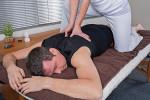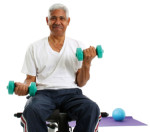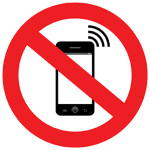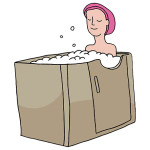18 Ways to Relieve Stress
Posted on June 2, 2015 by bob in Features
Stress is often seen as a negative effect on the body, but it is very essential to life. It is the “fight or flight” system that is naturally part of our survival system. Stress is bad when it overwhelmingly impacts our health equilibrium. Everyone deals with stress, in one way or another. It is associated with higher levels of cortisol, a hormone produced by the adrenal glands. Accumulated unmanaged stress can lead to major physical and psychological illness, including depression, overeating, excessive sleep, and irritability. While it is impossible to avoid stress completely, it is possible to manage your stress. Here are a few ways:
1. Get a massage — Massage has been shown to be effective in reducing mental and physical stress. In one study in the Journal of General Internal Medicine, massage helped lessen stress and pain in patients who have chronic pain. Another study in the Australian Journal of Advanced Nursing suggested that 15 minute massages helped reduce the psychological stress of their test subjects. Massage lowers the level of cortisol and increases levels of serotonin and dopamine.
of General Internal Medicine, massage helped lessen stress and pain in patients who have chronic pain. Another study in the Australian Journal of Advanced Nursing suggested that 15 minute massages helped reduce the psychological stress of their test subjects. Massage lowers the level of cortisol and increases levels of serotonin and dopamine.
 2. Go for a walk — Going for a walk can clear your mind and keep your body healthy. Walking helps increase your endorphins, giving you a euphoric feeling while reducing cortisol levels. In addition to providing a boost of energy, walking also reduces fatigue. Simply being outside helps eliminate stress and increase memory and attention span.
2. Go for a walk — Going for a walk can clear your mind and keep your body healthy. Walking helps increase your endorphins, giving you a euphoric feeling while reducing cortisol levels. In addition to providing a boost of energy, walking also reduces fatigue. Simply being outside helps eliminate stress and increase memory and attention span.
3. Pets help reduce stress — Pet therapy helps reduce anxiety and stress for many people. Research has shown that  patients experienced a 37% reduction in anxiety if they spent time with animals before their medical procedures. Having an animal around distracts people from their worries. Stress relief pets lower blood pressure and cortisol. While dogs and cats are usually the choice of pet for stress relief, other animals can also help. The simple distraction of watching fish in an aquarium has been shown to reduce blood pressure.
patients experienced a 37% reduction in anxiety if they spent time with animals before their medical procedures. Having an animal around distracts people from their worries. Stress relief pets lower blood pressure and cortisol. While dogs and cats are usually the choice of pet for stress relief, other animals can also help. The simple distraction of watching fish in an aquarium has been shown to reduce blood pressure.
 4. Drink tea — Green tea lowers your blood pressure and is full of antioxidants beneficial for your health. In one six week study, individuals drinking black tea had lower cortisol and stress levels than subjects drinking placebo drinks.
4. Drink tea — Green tea lowers your blood pressure and is full of antioxidants beneficial for your health. In one six week study, individuals drinking black tea had lower cortisol and stress levels than subjects drinking placebo drinks.
5. Get proper sleep — Research in children has shown higher levels of cortisol after disruptive sleep. After restful, high quality sleep and peaceful naps, cortisol levels decrease. Another study on healthy young men has shown that taking proper naps throughout the day also lowers cortisol levels.
6. Deep breathe — By taking deep, slow breaths, blood pressure and heart rate slow down, counteracting the effects of stress. Deep breathing allows you to relax and clear your mind. Also used in meditation, this stress-reliever has been shown to reduce anxiety and help individuals suffering with depression.
7. Work out — Hit the gym or go for a run. Exercise allows your body and mind to focus on something that is healthy for your well-being. While it distracts you from the cause of your stress, it also increases your endorphins and decreases your levels of cortisol. Endorphins are the natural “feel good” hormones released when you exercise. The more aerobic your workout, the more endorphins your body releases.
 8. Use guided visualization — This is a technique that many people use to relax, control their stress, and achieve goals. Research shows that subjects report less perceived and dyadic stress after using guided visualization. Guided visualization allows people to imagine and consciously think about certain issues, helping them work through stressful problems.
8. Use guided visualization — This is a technique that many people use to relax, control their stress, and achieve goals. Research shows that subjects report less perceived and dyadic stress after using guided visualization. Guided visualization allows people to imagine and consciously think about certain issues, helping them work through stressful problems.
9. Aromatherapy can be calming — Certain plant oils have been found to relieve nervous tension or anxiety. The scents of some plants, such as lavender, can ease stress and relax us. Scents can create a mood and some may even help us recall pleasant memories or thoughts associated with a smell. Aromatherapy is often used with massage, meditation, and hot baths and can provide a calming experience for those who use it.
10. Turn your phone off — Your smartphone provides access to the rest of the world, which can be a stress enabler. Constant  contact with events occuring in your close online circle or in the world at large can create anxiety. According to one study, access to work-related emails through smartphones causes higher stress in individuals. By turning off your phone, you shut the external stress out, allowing you to focus on yourself and your immediate surroundings. Escaping technology can be a very relaxing experience, whether it’s for a weekend or during a longer vacation.
contact with events occuring in your close online circle or in the world at large can create anxiety. According to one study, access to work-related emails through smartphones causes higher stress in individuals. By turning off your phone, you shut the external stress out, allowing you to focus on yourself and your immediate surroundings. Escaping technology can be a very relaxing experience, whether it’s for a weekend or during a longer vacation.
 11. Enjoy a hot bath — A hot bath can help relieve the tension in your muscles, lessen the pain on your body, and provide a comforting environment. It also promotes blood circulation and calms the nervous system. Water can be infused with minerals and other products such as Dead Sea salts or aromatic oils to produce a soothing feeling.
11. Enjoy a hot bath — A hot bath can help relieve the tension in your muscles, lessen the pain on your body, and provide a comforting environment. It also promotes blood circulation and calms the nervous system. Water can be infused with minerals and other products such as Dead Sea salts or aromatic oils to produce a soothing feeling.
12. Meditate — Meditation has been used for thousands of years to assist with relaxation. It is an inexpensive technique that can be used for releasing stress and allowing you to clear your mind. Pairing it with breathing exercises can further lower your heart rate and blood pressure. Meditation can help you find tranquility and clarity in your thoughts.
13. Practice Tai Chi or yoga — Yoga and Tai Chi are excellent weight and stress management tool. They help with balance,  flexibility, and strengthening your core. Studies have shown that Tai Chi and yoga are promisings method of reducing anxiety and stress. While Tai Chi or yoga should not completely replace pharmacological medication to help with anxiety and stress, some professionals recommend both as supplements to pharmacological medicine. Tai Chi originated in China, and yoga came from India. Both have been around for centuries.
flexibility, and strengthening your core. Studies have shown that Tai Chi and yoga are promisings method of reducing anxiety and stress. While Tai Chi or yoga should not completely replace pharmacological medication to help with anxiety and stress, some professionals recommend both as supplements to pharmacological medicine. Tai Chi originated in China, and yoga came from India. Both have been around for centuries.
14. Laugh — Going to a comedy show or watching a funny movie will help manage your stress. One study showed that there are lower levels of the salivary endocrinological stress marker chromogranin A (CgA) in people who watched a humorous movie. Along with less stress, these subjects also reported a feeling of being uplifted and fulfilled.
 15. Write down your thoughts — Keeping a journal or diary of your thoughts and activities allows you to better express yourself. It may help you understand your feelings, organize your thoughts, and reflect on your choices.
15. Write down your thoughts — Keeping a journal or diary of your thoughts and activities allows you to better express yourself. It may help you understand your feelings, organize your thoughts, and reflect on your choices.
Your journal is a place for you to release emotions that you wouldn’t otherwise let out. Another positive aspect of journaling is writing down your negative emotions, enabling you to move on with the positive ones.
16. Try a craft — Finding a hobby and keeping your hands busy will distract your mind from stressors. Studies have shown that doing a craft enhances relaxation, especially for children and seniors. It is used quite often as a therapeutic healing method. Crafting is helpful because it allows you to express yourself in an artistic way.
17. Listen to music — Music can affect an individual’s moods or thoughts. One study has shown that post-surgical patients who  listened to music had reduced stress levels compared to patients who had not. Research also shows that people from different cultural backgrounds may prefer different types of music for pain and stress relief. While everyone’s preference is different, find music that is soothing for you.
listened to music had reduced stress levels compared to patients who had not. Research also shows that people from different cultural backgrounds may prefer different types of music for pain and stress relief. While everyone’s preference is different, find music that is soothing for you.
 18. Avoid caffeine — Try to avoid coffee, energy drinks, and other drinks that are heavy in caffeine. Caffeine increases catecholamines and cortisol – stress hormones – while increasing dopamine for a fast “feel good” response that will wear off quickly and make you feel low. Try drinking green tea instead.
18. Avoid caffeine — Try to avoid coffee, energy drinks, and other drinks that are heavy in caffeine. Caffeine increases catecholamines and cortisol – stress hormones – while increasing dopamine for a fast “feel good” response that will wear off quickly and make you feel low. Try drinking green tea instead.
Takeaway Point: Stress is needed for survival, but it is important to control your stress. If left unmanaged, it can build up and cause psychological and physical harm. Stress relief is different for everyone; how one person manages their anxiety and stress may not necessarily work well for someone else. Explore different methods to find the solution that works best for you.
Courtesy: LabDoor.com









